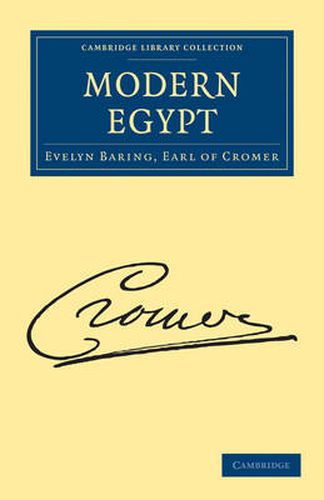Readings Newsletter
Become a Readings Member to make your shopping experience even easier.
Sign in or sign up for free!
You’re not far away from qualifying for FREE standard shipping within Australia
You’ve qualified for FREE standard shipping within Australia
The cart is loading…






Evelyn Baring, 1st Earl of Cromer (1841-1917), was a British statesman and colonial administrator. After a successful career in the War Office he was appointed the Controller General of Egypt in 1879. After the 1882 Anglo-Egyptian War, Baring became Consul General of Egypt, a position he held until his resignation in 1907. Modern Egypt, published in 1908 and revised in 1910, can be regarded as his justification for his actions in Egypt, and has been described as ‘one of the classic works of Victorian imperialist writing’. It explains why Britain became involved in Egypt, when the collapse of the economy threatened the political stability of the region. Subsequently Britain and France took dual control, to keep Ottoman Turkey out, and to protect access to the Suez Canal. Cromer was an influential player in the events he describes, and, allowing for bias, the book remains a valuable record.
$9.00 standard shipping within Australia
FREE standard shipping within Australia for orders over $100.00
Express & International shipping calculated at checkout
Evelyn Baring, 1st Earl of Cromer (1841-1917), was a British statesman and colonial administrator. After a successful career in the War Office he was appointed the Controller General of Egypt in 1879. After the 1882 Anglo-Egyptian War, Baring became Consul General of Egypt, a position he held until his resignation in 1907. Modern Egypt, published in 1908 and revised in 1910, can be regarded as his justification for his actions in Egypt, and has been described as ‘one of the classic works of Victorian imperialist writing’. It explains why Britain became involved in Egypt, when the collapse of the economy threatened the political stability of the region. Subsequently Britain and France took dual control, to keep Ottoman Turkey out, and to protect access to the Suez Canal. Cromer was an influential player in the events he describes, and, allowing for bias, the book remains a valuable record.